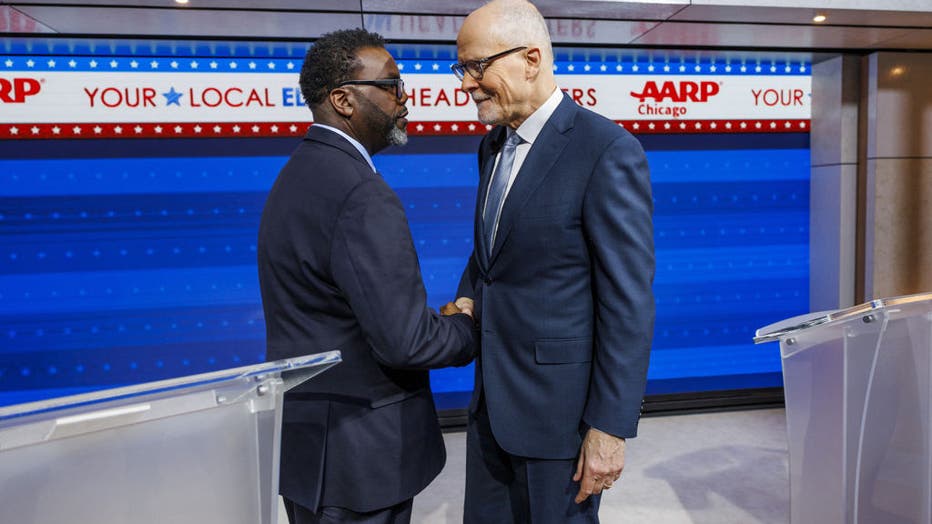Chicago mayoral race: Vallas team predicts no clear winner on election night

Tempers flare as Johnson, Vallas met for their final forum before Election Day
Chicago starts counting the votes for mayor in one week.
CHICAGO - Paul Vallas’ war room expects Tuesday’s mayoral runoff to be so close, the winner may not be known until days after the election, when most of the mail-in ballots are counted.
"There’s a good chance on election night it will be too close to call," Vallas’ campaign manager Brian Towne said Wednesday.
Veteran Democratic political strategist Joe Trippi, an adviser to the Vallas campaign, said Chicagoans should "count on" not knowing whether Vallas or Brandon Johnson will be their 57th mayor until a few days after polls close. The number of mail-in ballots is almost certain to be "bigger than the margin" separating Vallas and Johnson, he said.
"People — not just in Chicago, but around the country — have used mail-in ballots as their standard way of voting. There’s so many of those people now that, even if you have a fairly sizable winning margin on election day, there will be so many [outstanding] ballots. They may not all be turned in … we’ll have to wait for them," Trippi said.
"We could be in a position where somebody even has a decent lead, but no one can call it. There’s no official way to do it until everything’s in. So it could take a while," he added. "Count on it."
SUBSCRIBE TO FOX 32 CHICAGO ON YOUTUBE
Brandon Johnson’s team wouldn’t go that far, but acknowledged external and internal tracking polls show the five-week runoff sprint is likely headed for a photo finish.
Every ballot returned by 7 p.m. Monday will be counted on election night. The rest will have to wait. Technically, the Chicago Board of Elections has until April 18 to count all vote-by-mail ballots postmarked by 7 p.m. on election night.
"People thought we’d be waiting several days to know who was in the runoff and we were able to essentially call it around 9 p.m.," said Jason Lee, a senior adviser for Johnson’s campaign.
"I don’t want to speculate on … when we’ll be in a position to call the race. We want to make sure that every single vote is counted and that the people of Chicago can feel confident at the results."

Mayoral candidates Brandon Johnson and Paul Vallas shake hands before a mayoral debate in Chicago, on March 21, 2023. (Armando L. Sanchez/Chicago Tribune/Tribune News Service via Getty Images)
Brandon Davis, the Johnson campaign’s senior media strategist, added: "Our anxiety over being able to land things on election night is dissipated a bit as we’ve taken on new ways that allow, frankly, more voters to be a part of the process that want to be part of the process. Our campaign welcomes that."
In interviews Wednesday with the Sun-Times, both teams talked about how they planned to get their candidates over the finish line in what has turned into a battle for the heart and soul of Chicago.
The Vallas team was a bit more forthcoming.
They say Vallas will be the next mayor of Chicago if he can hold his base in white ethnic wards on the Northwest and Southwest sides, downtown and in more affluent north lakefront wards, boost turnout there by up to 25%, get 25% to 30% of the African American vote and over 60% of the Latino vote.
Trippi expects the race to be determined by the 10% of undecided voters — many of them older, "moderate-to-conservative" African Americans — who are "wrestling" with two questions: Is Paul Vallas "not a Democrat," and does Brandon Johnson "really have a goal of defunding the police?"
Those voters are "listening to everything and trying to discern what’s real, what’s true. And the advantage that we have right now is with Dick Durbin, Bobby Rush, Jesse White, Sophia King. A whole slew of Democrats who are telling people they know Paul Vallas. He is a pro-choice Democrat," Trippi said.
"As that becomes clearer to that group … we have a real opportunity to break away."
Johnson’s team identifies "multiple pathways to victory" and "strategies for executing on all of them," Lee said.
It starts with "consolidating the African American vote," making Hispanic majority wards a "competitive battleground demographic" and "extending that as much as possible" into working-class white communities.
Their trump card could be a 2,000-strong get-out-the-vote army, including many members of the Chicago Teachers Union, SEIU Locals 1 and 73, SEIU Healthcare and AFSCME Council 31. Vallas hopes to match that with help from the 26 unions that have endorsed him.
"On the lakefront, we did well in round one. We think we’re gonna continue to do well, particularly with women voters in those areas who believe in a Chicago that works for everyone and are frankly turned off by some of the rhetoric," Lee said, referring to incendiary remarks by Fraternal Order of Police President John Catanzara — remarks Vallas has denounced.
On the eve of a rally for Johnson headlined by U.S. Sen. Bernie Sanders, Lee said: "We have that Milwaukee [Avenue] corridor base — those wards where we did very well. We think we can generate additional turnout in those wards. There’s a lot of enthusiasm we can tap into. We’re gonna look at generating as many votes from our areas of strength as possible."
The race has become a choice between "two different visions" for Chicago and "two different strategies for delivering real safety and real economic opportunity," Lee said.
"This is a city that prides itself on Democratic values. … The values that Mr. Vallas has expressed, which can be summarized by Republicanism, are not consistent with the average voter in Chicago," Lee added.
"If the values are off, it’s difficult to trust that the strategy will not end up in a direction that you don’t want to go."

